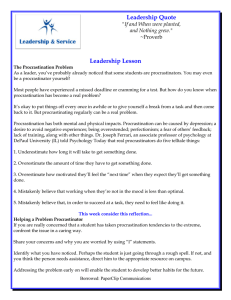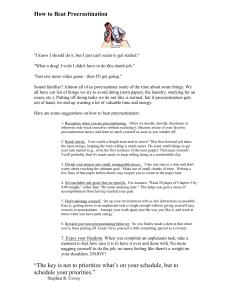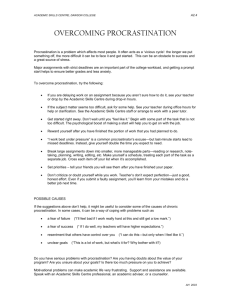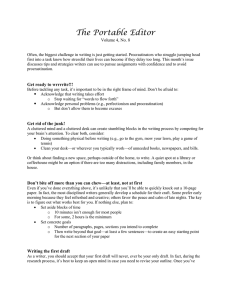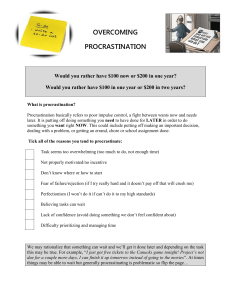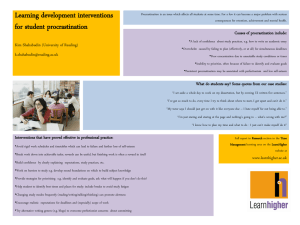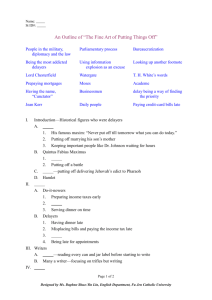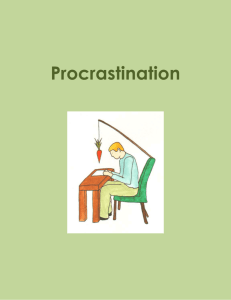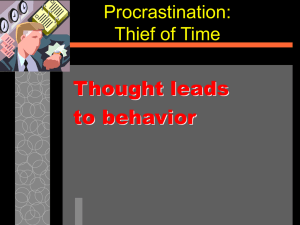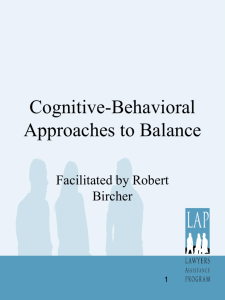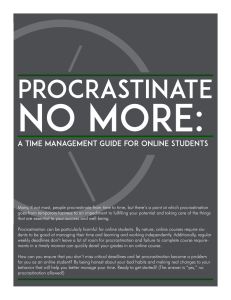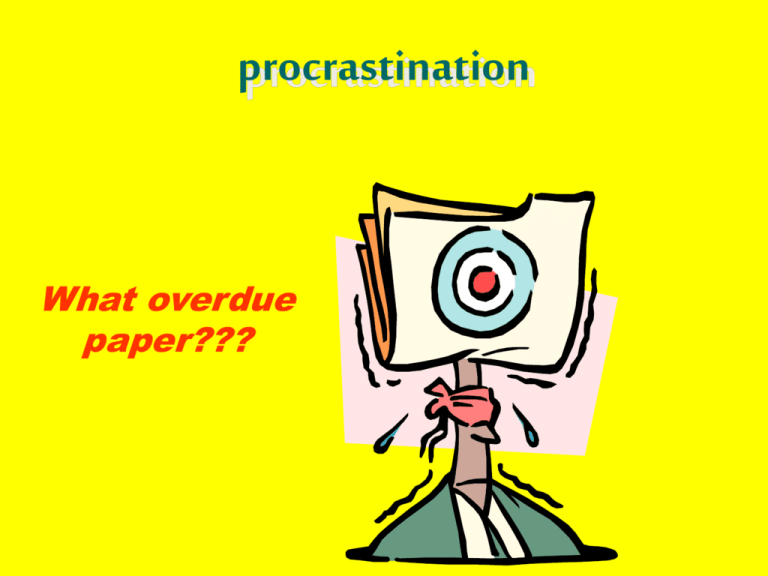
procrastination
What overdue
paper???
Q: What is the greatest
labor-saving device ever
invented?
A: Do you mean
besides
procrastination?
Chronic
Procrastinators:
• … feel recurring regret.
• … are filled will good intentions.
• … don’t understand why they
delay time after time.
• … are quick to rationalize, saying
they can’t change.
Procrastinating
students:
• … get more cold and flu symptoms
• … are more likely to eat poorly
• … are more likely to smoke
• … get less sleep and drink more
“People who procrastinate
tend to be less healthy,
less wealthy
and less happy.”
- according to a study by University of Calgary professor
Piers Steel.
Procrastinators usually do NOT
produce their best work
because they get impulsive
at the last minute:
•
•
•
•
They work quickly
They take shortcuts
They make careless format mistakes
They haven’t collected enough resources
Personality components
•Fear (e.g. of failure or of rejection)
•Different priorities (some things are not
important enough to them)
•Power trips and attention grabs (footdragging on purpose)
Perfectionism:
Often tasks are fussed over long after
they have been sufficiently achieved.
This fussing and tinkering often serves
to delay tackling other problems.
Boredom:
Boring jobs are very easy to delay
for shallow reasons.
Here self-discipline is needed.
Hostility:
If you are hostile to the task,
or to the person giving the task,
there is a strong temptation to delay.
The “Deadline High”:
Coming up against a tight deadline and
meeting it is immensely satisfying.
It can be associated with
strong rushes of adrenaline
and you may find that jobs are being
unconsciously delayed
precisely to get this rush.
Cognitive Components
• If the cause is inefficient work habits
• Learn to focus
• Learn to break a task down
• Harness momentum and overcome inertia
• If the cause is poor estimation of time
• learn how to estimate “back-time,” i.e. start
from the deadline and accurately gauge
backwards when and how much each step of
the task really needs
Paralysis CAUSED by planning:
The planning process is drawn out
to avoid confronting an issue.
Plans are argued, polished
and perfected,
but the implementation is delayed
unnecessarily.
Emotional Patterns
behind the
6 Types
of Procrastinators
1. Perfectionists
• They fear they’ll fall short of their
unrealistically high standards
• They get buried in details, hoping to
avoid mistakes.
Perfectionist checklist:
Do I get preoccupied with details that others don’t
seem to care about?
Do I have difficulty starting/ finishing a task
because my own standards haven’t been
met?
Am I reluctant to delegate tasks or work with
others unless they work my way?
Do I think about situations in terms of black and
white, in extremes?
Do others say that I am rigid, stubborn, finicky?
Am I critical of my accomplishments or how long
they took?
Does my work have to be as good as it possibly can
in order to satisfy me?
Do I look at my failures as embarrassments I would
not want revealed?
Do I have trouble maintaining a sense of humor
while learning something?
Am I upset if I don’t perform as well as a peer?
Perfectionist students get
addicted to saying
“Hey, considering how little
time I had,
that B- is pretty good.”
They really don’t want to
chance having their best
work evaluated.
2. Dreamers
• They’re vague, unrealistic, romantic,
leading to a lot of wishful thinking.
• Their grandiose plans are not turned
into solid goals and plans.
• They’re unable to deal with details.
3. Worriers
• They have a small “comfort zone” and
easily become overwhelmed.
• They avoid risk or change.
• They lack confidence in their ability to
make decisions.
• They keep saying “What if…?”
4. Crisis-Makers
• They’re proud that they can only get
motivated at the last minute.
• They live for the adrenaline rush and life on
the edge, such as a procrastination crisis.
• They have a very low boredom threshold.
• They avoid routine projects - both starting or
completing them.
Some personalities thrive on
stress instead of feeling
anxious
“If it weren’t for
stress,
I’d have no
energy at all”
A benefit of postponing
your work:
If you procrastinate long enough,
you are so backed up to the wall
that have no choice
but to perform at lightning speed
with total concentration
The net result is a full day’s
work in, say, an hour!
How much more efficient* can
you get????
*EFFICIENCY = INTELLIGENT
LAZINESS
Chronic stress responses
for “Crisis-Makers”
Too much cortisol rushing to
the brain hurts thinking.
Fatigue, anger, depression
Immune system weakens
and can’t fight infection
Blood pressure and heart
rate damage the elasticity of
blood vessels
Ulcers
5. Defiers
• Type #1: the aggressive, argumentative,
sulky types.
• Type #2: the passive-aggressive types
who promise to do something and don't.
6. Overdoers
• They’re always working so they may not
seem like procrastinators.
• They make extra work and don’t focus on
what really needs to be done.
• They have difficulty saying no and delegating.
• They’re candidates for early burnout.
PROCRASTINATION
Last-minute
effort
Mediocre
performance
More
PROCRASTINATION
MORE ANXIETY
EVEN POORER
PERFORMANCE
Procrastination is an
inability to regulate
behavior and control
impulses:
If you’re quite impulsive,
then you’re unable
to protect one intention
from another.
Paying off your Mastercard
with your Visa card…
…does NOT get you out of debt
6 Ways to control the outside world
1.
2.
3.
4.
5.
6.
Learn to say NO
Hang a “do not disturb” sign on your door
Get ready the night before
Call ahead
Avoid noise distractions
Manage interruptions
Copyright © Houghton Mifflin
Company. All rights reserved.
Questions for when you get stuck
•
•
•
•
•
Could I find the time if I really wanted to?
Am I willing to promise it?
Am I being too hard on myself?
Can I do just one more thing?
Can I delegate this?
• Would I pay myself for what I’m doing right
now?
• Am I making time for things that are
important but not urgent?
• What is one task I can accomplish toward
achieving my goal?
• Is this a “piano” (too big a task for just one
person)?
Reduce the procrastination impact
on your work:
•Set artificial, earlier-than-necessary deadlines
•Try to do things right away, as they occur to
you
•Focus on single tasks:
•Do the prioritizing one task and one
deadline at a time, like poking holes into a
slab of cheese
PARKINSON’S
LAW:
“Work
…to
the time available
for its completion.”
• Remove distractions
•
•
•
•
Cellphones
TV
Internet
Hunger, thirst, discomfort, drowsiness
• Acknowledge the consequences - the
practical downside of not moving on
• Provide juicy rewards – in increments - for
accomplishing pieces of work
The internet is a black hole
sucking you dry…
POSITIVE, self-motivating
statements
• “The sooner I get done, the sooner I can play.”
• “There’s no time like the present.”
• “It’s cheaper (less painful, more effective) if I
do it now rather than wait until it gets worse.
• “There’s no such thing as perfection: the
motto of Washington, DC: “It’s good enough
for government work”
Use prompts as reminders
7-Day Anti-Procrastination Mnemonic
Monday
Tuesday
Wednesday
Make it meaningful – benefits of finishing
Take it apart – “Swiss cheese” it
Write an Intention Statement – I promise…
Thursday
Tell everyone – make yourself accountable
Friday
Find a reward – and withhold if necessary
Saturday
Settle it now – Plunge in. Do it now
Sunday
Say NO – if you really don’t intend to do it
Brasington’s Ninth Law
A carelessly planned project takes
THREE TIMES longer
to complete than expected.
A carefully planned one
will take only TWICE as long….
Lord, help me to always give
100% at work:
• 12% on Mondays
• 23% on Tuesdays
• 40% on Wednesdays
• 20% on Thursdays
• 5% on Fridays…
100%

